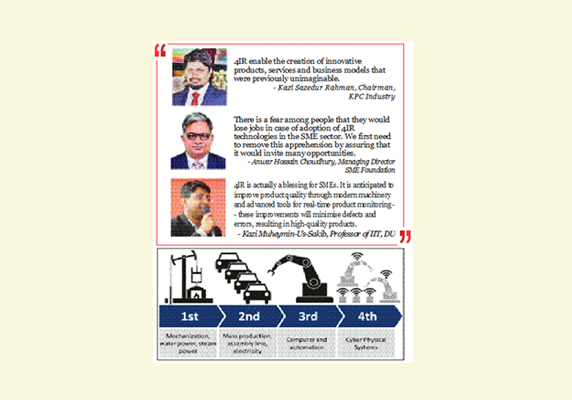

Niaz Mahmud: In the age of the internet, Kazi Sazedur Rahman, chairman of KPC Industry, struggled to market his products. The Fourth Industrial Revolution (4IR) tools and technologies, which have revolutionised modern day marketing, he felt were not for small and medium enterprises (SMEs) like his but for large organisations.
However, after adopting 4IR tools on the goading of his well-wishers, the fortunes of Sazedur's factory changed dramatically. His factory's turnover is increasing day by day as he is now able to reach a wider audience and positioning his products appropriately.
"4IR is actually a blessing for SMEs," said Kazi Muheymin-Us-Sakib, professor at the Institute of Information Technology at the University of Dhaka.
"It will be a blessing for SMEs," said Kazi Muheymin-Us-Sakib, professor at the Institute of Information Technology (IIT) at the University of Dhaka.
4IR will enable businesses to offer a more personalised, efficient and quality-driven customer experience through advanced technologies.
"It is anticipated to improve product quality through modern machinery and advanced tools for real-time product monitoring -- these improvements will minimise defects and errors, resulting in high-quality products."
It can help SMEs better meet customer requirements and facilitate mass customisation of products too.
It will allow business entities to use their resources more effectively to reduce production time and increase profitability, said Sakib, also a researcher on 4IR.
4IR will help SMEs collect and analyse data regarding market trends, customer preferences and operational performance.
These data-driven insights will enable SMEs to make informed decisions, leading to strategic business improvements, he added.
"We believe that 4IR will bring significant changes to two main aspects -- creating new job opportunities and businesses and increasing worker productivity," said Sazedur, the winner of Best National SME Entrepreneur of the Year (2016).
4IR is characterised by rapidly advancing and integrating cutting-edge technologies such as artificial intelligence, the Internet of Things (IoT), blockchain and 3D printing.
"These technologies enable the creation of innovative products, services and business models that were previously unimaginable."
However, successful integration of 4IR technologies into SME operations necessitates a collaborative effort involving government bodies, industry associations, academia and civil society organisations, Sazedur added.
As things stand, very few SME owners currently utilise 4IR-related tools and technologies such as ChatGPT and Copilot in their organisations, according to a study titled "The Fourth Industrial Revolution: Opportunities and Challenges for SMEs in Bangladesh" by the SME Foundation.
This disparity is attributed to several challenges: lack of knowledge, financial issues, lack of proper training, safety and security-related matters, infrastructure limitations and information accessibility.
Many SME owners lack knowledge of existing 4IR tools and technologies and how to integrate them into their companies or businesses, the study found.
4IR-related tools and technologies are often expensive, posing financial challenges for SMEs, it said, adding that some SME owners cite a lack of training opportunities or workshops related to 4IR as a barrier.
Many participants highlight insufficient infrastructure, particularly internet availability and speed, as a barrier to effectively utilising 4IR technologies.
A dedicated platform for SMEs to exchange information is lacking, hindering their ability to access assistance or guidance. Despite their interest, employees are unsure of whom to contact for help.
Furthermore, although workers are interested in learning modern tools and technologies, they struggle to find suitable resources, according to the study.
To address the challenges, several steps have been taken such as establishing one-stop digital service centres and arranging training for SME owners.
"There is a fear among people that they would lose jobs in case of adoption of 4IR technologies in the SME sector. We first need to remove this apprehension by assuring that it would invite many opportunities," said Anwar Hossain Chowdhury, managing director of SME Foundation.
There are 78 lakh small and medium entrepreneurs throughout the country and 2.5 crore people are directly or indirectly involved with the sector.
They would need training, he said.
Subsequently, the SME Foundation has sought an allocation of at least Tk 500 crore in the upcoming budget.
"Then we can bring more entrepreneurs to the sector by providing easy loans and implement the SME Policy 2025 too," he added.
In most developed countries, the SME sector contributes to over 50% of the GDP. In India, the ratio is 60% and in Vietnam 45%.
But in Bangladesh, it is just 31% of GDP, according to data from the planning ministry.
In Bangladesh, SMEs account for 45% of productive value addition, 80% of industrial employment and 25% of working people.

